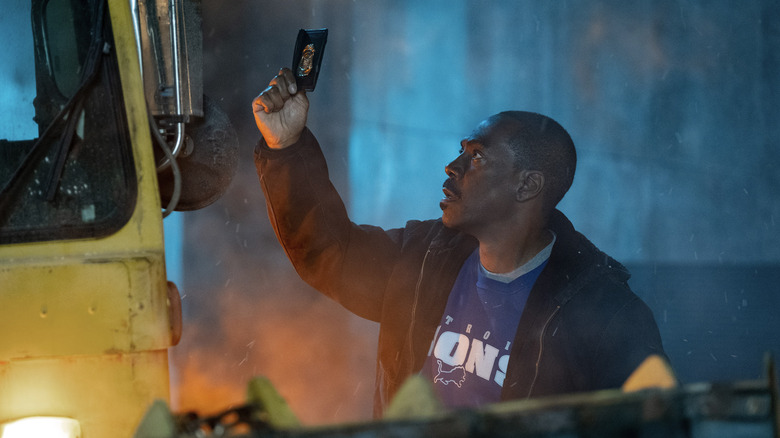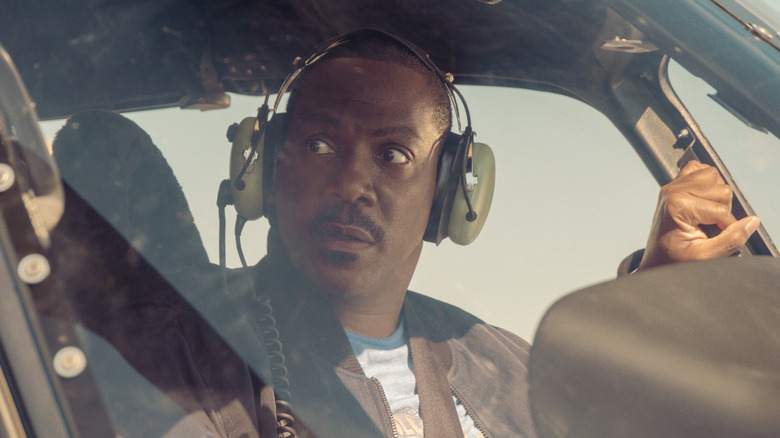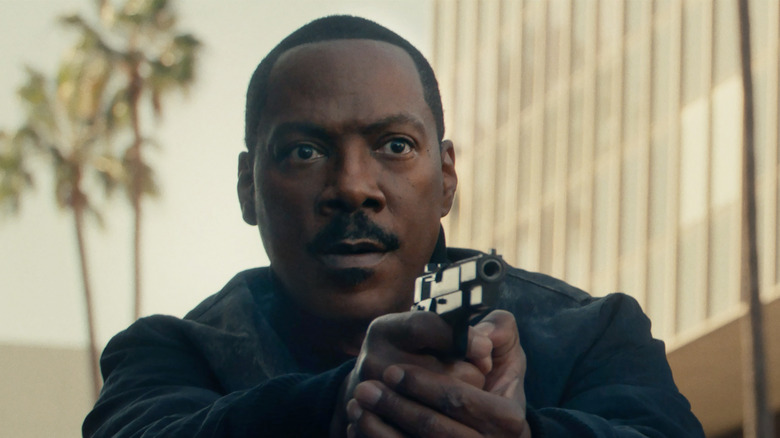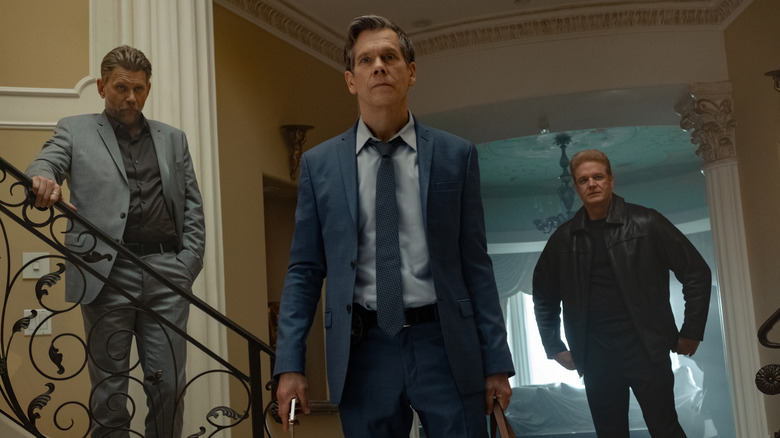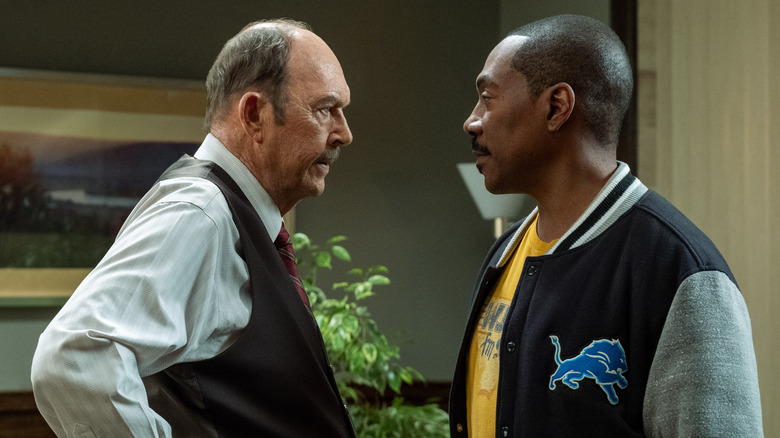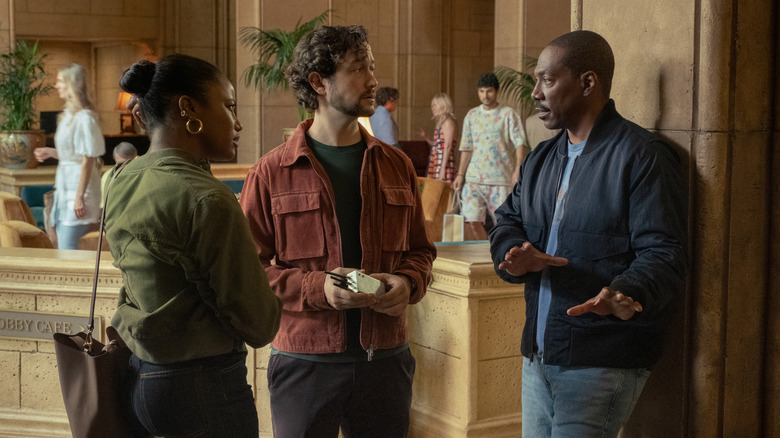Beverly Hills Cop: Axel F Director Realized There's One Thing You Never Do With Eddie Murphy [Exclusive Interview]
This interview contains spoilers for "Beverly Hills Cop: Axel F."
It's been thirty years since the atrocious "Beverly Hills Cop III" seemingly killed the franchise for good, and longtime fans of the franchise can breathe a sigh of relief: The bad taste left in our mouths from that movie has finally been washed away. The brand new and long-gestating "Beverly Hills Cop: Axel F" may not be able to live up to the towering classic status of the first two films, but it's lightyears ahead of the third movie. Murphy feels like he still has a handle on this character and brings him into the modern world while still retaining some of what we love about him. That's a tricky balance to pull off without falling back too many times on the same exact lines we've seen before, and director Mark Molloy was instrumental in helping Murphy strike that balance.
Molloy, a longtime commercial director, steps into the big leagues here and acquits himself well behind the camera as he tries to recapture the tactile nature of those bombastic 1980s Don Simpson/Jerry Bruckheimer productions. There's a helicopter chase that ends this movie that's done practically, and you can feel how dangerous it is while you're watching. Most movies would have opted to take the fully-CG approach, but Molloy and his team wanted to film it for real.
I spoke with the director over Zoom about his approach to this movie, how he handled Eddie Murphy's improv on the set, bringing in a new generation of characters while also leaning on some familiar faces, and how he thought about nostalgia when it came to this entry in the franchise.
Note: This interview has been lightly edited for clarity and brevity.
Axel Foley is the most important character of Eddie Murphy's career
This is your first feature film, but you've been directing commercials and things like that for well over 20 years at this point. So when you first got the call from Jerry Bruckheimer saying that he wanted to work with you, did he mention if there was one specific commercial or piece of work that he saw that put you on his radar?
He didn't mention anything on the first call that we did. He didn't mention anything specific. But since then, he's told me that there was a bunch of work, a lot of the Apple work I've done, and I did a sort of series of short films for Apple, he'd seen those amongst other things. I don't know what got Jerry's [attention], but I'm just glad my work caught his eye.
I was curious if you had to get special approval from Eddie Murphy, or was Jerry's sign-off enough to convince everybody that you were the guy for this project?
No, no, I had to get Eddie's approval, too. Had to get Eddie's approval, had to get Netflix's approval, had to get everyone's approval. So it was quite a journey. But yeah, me and Jerry went to Eddie's house and I just kind of pitched him my take on the film and yeah, luckily, Eddie agreed and loved it, and here we are.
What was he most concerned about when it came to reprising this role all these years later?
The first thing he told me, he told me it's the most important character he's ever played. It meant a lot to him, and I could really feel that. The main thing he really wanted to make sure was I understood the tone of the films and the balance of action and comedy. I know was really important to him. And also, I talked to him a lot about how we get to see different side to his character, the evolution of character, and Axel as a father, and Axel being vulnerable. I said, "We've never seen Axel Foley vulnerable." And that really excited me, and we talked through that. But Eddie had such a keen sense of the character in his head, too — not just who Axel Foley used to be, but that evolution of character.
Axel's biggest superpower is somewhat diminished in this movie
It was something of a creative risk for him to come back after all these years. Because I think even with the third movie, which is not widely accepted as being a great entry, this franchise is still very highly thought of in the film-loving community. You told me about what he was thinking going into it, but actually on the ground while you guys were making stuff, what kind of conversations were the two of you having about making sure that you struck that right balance to get Axel the way that he needed to be?
Yeah, we spoke a lot about different scenes and where to skew scenes comedic where the comedy fits in, and where we wanted it to be more grounded and more emotional and just let the action speak, or where we wanted to set up for the emotion, too. So we talked a lot about the rise and fall of the comedy and the drama and the action, all three of those things, on set. We were talking about that a lot.
To me, Axel Foley's superpower has always been his ability to read people and instantly know what he needs to do and say to get what he wants out of a given situation, and that happens a few times in this movie. I was curious if that aspect of the character was present in the first draft of the script that you read, or if that was added in later on when Eddie officially signed on, or how did that work?
Some stuff was there from the very start. Other stuff, we were working on even as we were shooting, we were still working on some of the scenes and getting Eddie's opinion on it and sort of reshaping them. But it's funny that you said that thing about Axel Foley's superpower. That's what really excited me about the script, too, is Axel Foley has all that power to do that. But then what I loved about the script too was then he gets to meet his daughter where none of his powers [work]. They're all useless against her. She's seen it all, lived it all. So she's his kryptonite a little bit. I think that was really fun to play with.
There is that great moment when the two of them go into that mode together and they try to talk their way into that building, into that rooftop party, so that was really fun to see as well. So after the pitch was over and after you got the job, when it came down to actually making this movie, what were you excited to bring to it as a director? Was there something specific that you really thought you could bring to this?
Yeah, I think one of the biggest things I really wanted to bring to it was I really looked at the tone of the first two films, and I wanted to get that same tone right. Get that balance between action and comedy, and also to ground the film. What I think about those two films is they were very grounded, those two films. Obviously, there's big comedy, huge action set pieces, but the films are grounded in character. So I really worked hard on that, on grounding the film, but also grounding the action, too. Shooting everything in camera, just pulling everything back a little bit, building action scenes around character rather than spectacles, and framing the film that way. And also, just trying to really give fans of the franchise what they want from a "Beverly Hills Cop" film, but also make it a little bit unexpected too, with this whole emotional angle to the film.
Mark Molloy wanted the film to feel like escapism
How did the movie change from the pitch to the final cut? Was there an evolution along the way?
Yeah, there was a big evolution, actually. Yeah, in that first pitch, we worked on the script a lot, we worked on a lot of the comedy and the relationships, a lot of the big action set pieces, some of them were there. So we did work on some of the action, but we worked a lot on the father-daughter relationship. We also worked a lot on the comedy, too, but the bones of the script were there from the very pitch. But definitely a lot of character stuff I worked on.
So modern audiences have a different level of awareness of real-life police wrongdoing these days than they might have during the '80s. And it seems like the Kevin Bacon character is meant to represent the rottenness that can come with that position of power. I was wondering what kind of conversations you had with him, and even with the screenwriters, about that aspect of the story.
Yeah, look, we didn't dive too deeply into trying to have a perspective on policing or anything like that with the film. That's not what a "Beverly Hills Cop" film ... it's escapism. Do you know what I mean? That's the type of film that it is, so we didn't do that. But I did speak to Kevin a lot about his character. And what I found really interesting was that half the time when I go into Beverly Hills, I'm kind of scared of the people in Beverly Hills [laughs]. They're kind of like all so perfect and so sheened and polished and everything like that. So me and Kevin spoke a lot about that and sort of shared these same feelings, of us being scared of these Beverly Hills people. So that affected it. We were looking at Beverly Hills even more so than we were trying to dig into the police aspect of things.
It kind of felt like some of the areas in Beverly Hills where you were filming, especially during the big truck chase at the end, that seemed like that was filmed right outside of Victor Maitland's house from the original movie. Did you actually go back and look to where that first film shot, or did it just happen to look that way?
No, I know where the first film was shot and it was there, but no, we didn't go back to the actual one. But definitely, we had echoes of that in our head. We wanted to bring back to that kind of timeless feel of that.
Getting the music right was crucial
Along those same lines, how important was it for you to get the music right in this movie? Because that was such a big part of the experience of watching the original film.
Totally. I got to make my first film, and someone gives me "Axel F" and is like, "Oh, you can use this in your film, too." I'm like, "Wow, okay. This is brilliant." So all along, I had such a love for that soundtrack, the soundtrack for one and two, I was just like, "I get to use these in my film!" We were playing it on set as we were shooting, we were playing the "Beverly Hills Cop" soundtrack because we just knew like, if we're panning, we were like, "Okay, yeah, let's make it go a little bit faster" or whatever.
Really, we worked a lot with Lorne Balfe, our composer, who did a brilliant job on making this — we wanted to make the soundtrack obviously such a big part of it, as it has been in other "Beverly Hills Cop" films. But also to show that we weren't trying to reinvent it or do anything like that. We wanted to show how much we loved the original and that this was our evolution of what had been there in the past. So with all this, a lot of it was just really like a love letter to those first two films a little bit, to show, "Hey, we love what's been in the past." We're going to bring it into a contemporary world, but we want people to know how much we love it.
That seems like a challenge that you would have to face in a bunch of different areas when making this movie in terms of how much to lean on nostalgia versus how much to bring it forward. Did you have sort of a North Star idea, like a guiding light of how to approach those questions in a bunch of different areas of making this film?
I don't think there's an exact North Star like that when you're doing that, because I think it can be a moving target sometimes. Do you know what I mean? And a lot of that, actually, a lot of the nostalgia happens in the edit, too. A lot of those decisions are happening in the edit suite. I think the interesting thing is that it's been 40 years since "Beverly Hills Cop" came out. This is not a sequel that's coming out five, 10 years after, like most of them do. You know what I mean? Normally, the sequels come out like a few years after, so it's been 40 years. [Editor's note: "Beverly Hills Cop 3" came out 30 years ago, in 1994.] So we wanted to make sure we took people back to that time and place and reminded them of what that film felt like and what a "Beverly Hills Cop" film feels like.
So we did use a lot of nostalgia to do that, but also to bring a new audience in and say, "Hey, this is what a 'Beverly Hills Cop' film is like," to them, too. So we definitely leaned on it more heavily at the opening of the film, where we wanted to really place people in Axel's world. This is where Axel's world, this is his safe space, and it is kind of caught in time a little bit. And then when we come to L.A., we feel the change, not just in tone, but also in generation a little bit, too.
You don't rein Eddie Murphy in when it comes to improv
Tell me about incorporating the next generation of characters in this saga in the form of Taylour Paige and Joseph Gordon-Levitt. When you came on board, did you tweak any of the dynamics those characters had with anyone else, or was it basically always planned to be as we see it in the movie?
Yeah, we tweaked both those roles a lot, especially Joseph Gordon-Levitt's role, just really trying to find that buddy cop thing. It's very much trying to find that rub between him and Axel and how that plays off but also serves the story as a whole too. And Joe was great. Joe came in with so many ideas on his character and how we can shape his character. We worked a lot with Joe once he came in to find his angle on the comedy. What's brilliant about Joe, why I really love him, is he's very funny, but he just plays it in a very different way to Eddie. He plays it very straight, and I think the two of them together, that's one of the things I love most about the film. Yeah, it's great.
And then Taylour always knew the — it wasn't about Jane being a comedic [force]. It wasn't about Axel and his daughter has to be this wise-cracking kind of thing. The script was built in a way where she's a lawyer and she's a kind of different character. When I first came on, Taylour was who I had in my head from the very start. There was a real strength in her eyes and strength of character. And it just was like, "I want to see her go to toe to toe with Eddie Murphy," which is not an easy thing to do, I can tell you. Yeah.
I know the first movie, famously he came in like a whirlwind and was responsible for so much improv and really helped contribute to that lightness of the tone in that first film. What was the improv process like for you? I mean, being presumably a fan of at least these first two movies, being on the set and watching Eddie Murphy improv, how do you decide when to rein him in?
You don't rein him in. [laughs] That's one thing I learned, that you do not rein Eddie in. Not every time it's gold, but you know where he's trying to take it or what he's going to do with it. So I just don't rein in, and the big thing I set out to do was just to create a space for Eddie to do his thing, or for Eddie and Joe to do their thing. To cast the right actors across from him, create room in the writing for that to happen, and create a space on set where Eddie can work his magic. That's a big part of my job, is to build that environment. Some of the funniest moments in the film is Eddie just improvising.
"Beverly Hills Cop: Axel F" is streaming now on Netflix.
